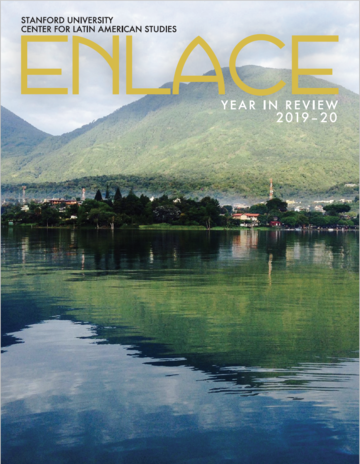Letter from the Director

Enlace AY 2019-20 Letter from the Director
The academic year 2019-20 at the Center for Latin American Studies (CLAS) started off with the excitement and flurry of activity that characterizes our Casa Bolívar. We held seminars, events, and conferences that, as this edition of our Enlace makes clear, continued our commitment to expanding our knowledge of the most relevant and transcendental topics of Latin America. Our emphasis was on those whose plight is especially challenging: the desaparecidos, the displaced and the migrant, the original peoples of the Americas, the descendants of the African slaves.
Through conferences and seminars by our Nabuco Brazilian Visiting Scholar, Latin American Perspectives lecturer, an unprecedented number of Tinker Visiting Professors, and other colleagues, we learned about issues as diverse as courts and colonialism; violence and torture; the environmental impact of infrastructure projects; migration and indigenous peoples; anti-corruption strategies; first contact of Amazonian peoples; financial inclusion; identification in forensic anthropology; communitarian responses to development; Andean landscapes; environmental history; abolitionism; drug trafficking; and the history of diplomatic relations. Our student working groups met and learned from each other and various guest speakers. We held the fourth annual CLAS Open House for our service workers and continued to support Nahuatl, Portuguese, and Quechua language training. Our M.A. student cohort, affiliated faculty, and the students who received CLAS financial support for their scholarship, fieldwork, and conference attendance continued to make important contributions, namely keeping our community alive and vibrant. In response to the COVID-19 pandemic, CLAS conducted its programming remotely during the spring and summer quarters.
In 2020, Latin Americans took to the streets to confront many long-standing social ills, including exclusion, racism, and sexism. Just as those social mobilizations were gaining speed, the COVID-19 pandemic emerged and, for a while, everything seemed to come to a standstill. However, as the pandemic ravaged countries across the globe, it also exposed social and racial inequalities and widened the economic divide, setting the stage for further political mobilization and community organizing.
The medical, economic, social, political, and human toll of the pandemic, along with the differential ability and willingness of our countries to face it, will have long-term consequences that we are only beginning to understand. Every forecast suggests this will be a lost decade for Latin America. And like many historical instances from past epidemics, much of the pain and suffering will not be the consequence of the pathogen itself, but of the collective response of our societies.
Bright spots can be found in our region. Cuba and Uruguay, despite having widely different political and social organizations, responded swiftly and effectively in the containment of the disease, saving countless lives. However, other countries, including Nicaragua and Venezuela, have fallen prey to the authoritarian temptation of denying and hiding the magnitude of the calamity. The presidents of the two countries with the largest economies, Brazil and Mexico, notwithstanding their seemingly opposite ideological leanings, responded similarly with what many people see as a bewildering mix of neglect and indecisiveness, dismissing the dangers of the virus and resisting calls for lockdowns. In comparison, Argentina, Peru, Chile, Ecuador, and Colombia have witnessed some of the longest social distancing measures in the world. In fact, most governments in Latin America imposed stringent public measures that, according to the science, would be decisive and swift enough to contain the contagion.
For the most part, citizens have been willing and able to abide by those curtailments in their freedom of movement and economic activity. Yet, personal costs have been disproportionately borne by the poor. National public health systems, led by brave nurses, doctors, and other medical personnel, confronted the medical crisis by providing compassionate care and saving lives. And essential workers continued supplying food and other necessities, preventing generalized shortages. But the success of confronting the pandemic in Latin America has been mixed. There is so much we do not understand and know about the SARS-CoV-2 virus, the health consequences of the disease for those who survive it, and the way in which our societies will confront the massive disruptions this crisis has generated in our economies, social fabric, and cultural landscapes.
Like the rest of Stanford, and our immediate community in Santa Clara County and California, CLAS adapted to new conditions of social distancing. Our team at Bolivar House worked relentlessly to rise to the challenge. Our students transitioned to remote learning, and we learned how to leverage new technologies to fulfill our mission. At the last Cafecito Quechua of the year, we engaged with Quechua scholars, songwriters, and activists beyond our borders. By the end of the academic year, we were able to hold a virtual celebration—in lieu of commencement—with a surprise keynote from Nobel Prize winner Dr. Rigoberta Menchú Tum, whose motivational message inspired us all to continue working with and advocating for the most vulnerable peoples in our societies. During summer 2020, CLAS has been organizing a series of online seminars and discussions in collaboration with other universities around the U.S. and Latin America. I am so proud of our students and the CLAS team who have creatively developed new forms of outreach and collaborations. We are now able to expand the scope of our events and academic discussions beyond the confines of the physical space of our beloved Bolivar House and its seminar room. We are also developing innovative ways to support our students, faculty, and communities of learning. CLAS continues to be relevant and remains committed to contributing to the knowledge, teaching, and learning of and from Latin America. It is our hope that our scholarship is put to the service of reducing human suffering and eradicating socio-economic injustices in the challenging times that lie ahead.
TO READ THE LATEST ISSUE OF ENLACE (2019-20), CLICK HERE.